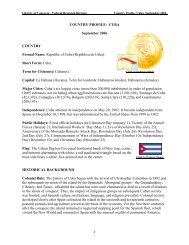1 - American Memory
1 - American Memory
1 - American Memory
You also want an ePaper? Increase the reach of your titles
YUMPU automatically turns print PDFs into web optimized ePapers that Google loves.
244<br />
become short under almost any stockpiling system. (For some items—the special<br />
order, style, and design items—shortages cannot be avoided.)<br />
Unfortunately, in spite of the higher aggregate inventories, some shortages<br />
can be expected. Specifically, it should be expected that a "food crisis" will<br />
always develop after a strike has progressed for a week or two because of the<br />
relatively limited supplies of some perishables and semi-perishables which are<br />
carried by Hawaiian businessmen. To be sure, some firms build their stocks when<br />
a strike threat looms—perhaps more than they should; but many businessmen<br />
probably can be expected to wait until the almost Inevltaole government inter-<br />
vention—either a Taft-Hartley injunction or u.se of the Governor's powers—<br />
permits the building of inventories, because it is not until this time that the extra<br />
cost of carrying additional inventory can be justified. Some expressed their<br />
philosophy as follows: "We would rather take a big hurt when necessary than<br />
many small ones". In other words, they cannot afford to hedge every threat and<br />
still hold prices down. Inventory carrying costs are too high. Also, they wish to<br />
offer you new, high quality merchandise—^not goods which have deteriorated or<br />
are almost obsolete.<br />
Some of these perishable, semi-perishable, and special order items which are<br />
difficult or iraxwssible to stockpile are critical enough so that some type of gov-<br />
ernment intervention probably can be expected to permit these items to come In.<br />
Itut then where should the line be drawn on what is critical? Further, if some<br />
stocks are to be brought in, this would suggest that a patch work solution which<br />
stockpiled only less critical items would be pointless and costly. A solution to the<br />
problem should provide for a supply of the critical items before handling the less<br />
critical ones.<br />
The State could grant a monopoly to someone, or itself, in the distribution of<br />
critical items such as rice and cannetl milk. But then it would have to require all<br />
businessmen to come to these warehouses in order to facilitate rotation of "old"<br />
merchandise. And If it were to maintain larger inventories than are now volun-<br />
tarily built at strike times, it would continually have to dump merchandise as<br />
it deteriorated. This would add to the already high inventory costs. Further, it<br />
would be necessary for the State to continually distribute "old" merchandise<br />
which has been stored close to its limit. In other words, Hawaii's residents would<br />
always be using "old" rice, canned milk, and other products. And probably, not<br />
occasionally, they would purchase spoiled merchandise If the stockpile managers<br />
were seeking to maintain maximum protection against strike threats. One way<br />
around this problem would be for the Governor to be willing to use his emergency<br />
powers to bring in stocks of items such as rice and canned milk just as soon as<br />
an emergency seemed to be developing. This, then, would enable the state monop-<br />
oly to hold down average Inventories and only build large stocks when it was<br />
obvious they might be needed. But this only stimulates current business practice<br />
and does not require a state monopoly. With such a state monoi>oly, perhaps<br />
supplies would be brought in just a little sooner than can be expected with the<br />
present business system where businessmen must watch their costs and prices.<br />
But this modification of a state monopoly probably would not lead to any different<br />
results than the present system if Hawaiian businessmen knew exactly if, when,<br />
and how the Governor would use his power to run ships in case of an emergency.<br />
These decisions would have to be made to make a state monopoly operable. So,<br />
if they can be made, it would seem preferable to modify an existing system which<br />
seems to be functioning quite well, rather than to create a whole new system<br />
which would yield similar results (and probably at no lower costs).'<br />
In other words, the stockpile approach suggested in House Resolution No. 100<br />
Is considered (1) unfeasible to keep the Hawaiian economy running normally<br />
for any length of time, and (2) unnecessary In the short run because Hawaiian<br />
businesses are already providing this function about as well as posible, grfven the<br />
Inherent perishability of some items and the purchasing behavior of consumers<br />
on others, notably on the multitude of items having style, design, color or special<br />
order characteristics.<br />
'The costs mleht actnallv be higher as State offlclals would not have as mnrh concern<br />
with cost. If In doubt, political considerations would probably areue for hlRher (and there-<br />
fore most costly) Inventories. Also, lack of competition would reduce pressure on cost<br />
control.



![Albert Einstein Papers [finding aid]. Library of Congress. [PDF ...](https://img.yumpu.com/21604228/1/190x245/albert-einstein-papers-finding-aid-library-of-congress-pdf-.jpg?quality=85)





![American Colony in Jerusalem Collection [finding aid]. Library of ...](https://img.yumpu.com/17941275/1/190x245/american-colony-in-jerusalem-collection-finding-aid-library-of-.jpg?quality=85)



![Piccard Family Papers [finding aid]. - American Memory - Library of ...](https://img.yumpu.com/17941234/1/190x245/piccard-family-papers-finding-aid-american-memory-library-of-.jpg?quality=85)


